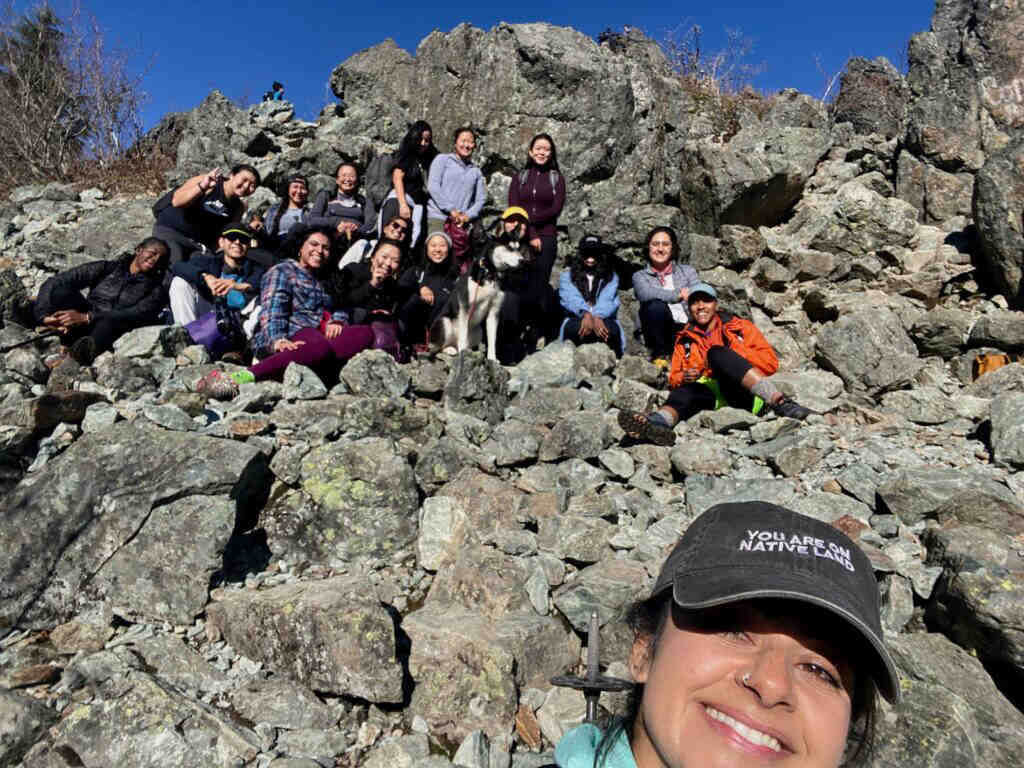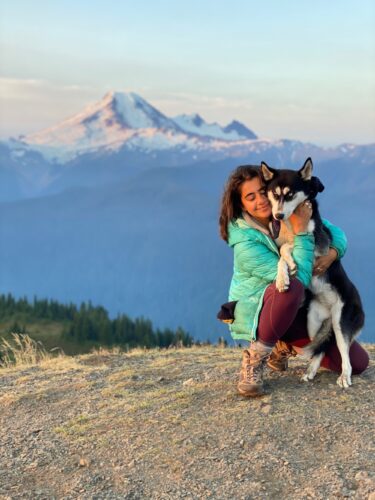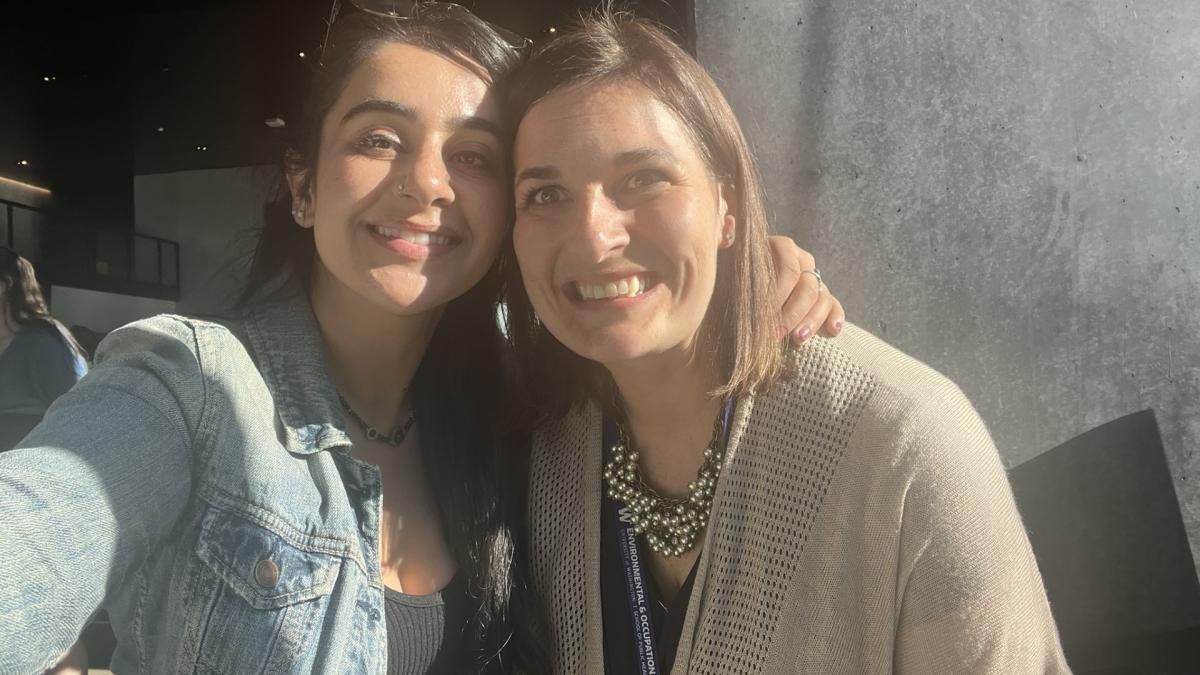Amber Khan
PhD, Environmental Health Sciences
Hometown
Bay Area, CA
Future plans
Working as a researcher in either academia or a nonprofit to explore and advocate for grassroots approaches to community resilience during and after disasters.
“If you don’t have housing, so many other things can go wrong with your health and well-being, both mental and physical. Not having a home is detrimental to your basic human needs.”
-Amber Khan
Amber Khan works at the intersection of two major challenges in public health: the housing crisis and the climate crisis.
In the fall of 2019, just as she was about to begin her PhD in the UW Department of Environmental & Occupational Health Sciences (DEOHS), Hurricane Dorian hit North Carolina.
Khan’s adviser, DEOHS Associate Professor Nicole Errett, recently recalled how, even before Khan arrived in Seattle for her graduate studies, “she jumped at the chance — and on a plane — to assist one of my colleagues conducting fieldwork on food insecurity in North Carolina” after the hurricane.
The story is emblematic of Khan’s commitment to both conducting groundbreaking research and contributing to climate change solutions. While working on her dissertation about disaster risk management to protect people living in low-income housing, she also founded supportive networks such as the group UW POC Outdoors, and engaged in climate activism and mutual aid efforts.
Khan, who graduated earlier this academic year, was recently named the 2025 DEOHS Outstanding PhD student.
“Amber is a rising star,” Errett said. “She is deeply and firmly committed to using her time and talents to build power for communities that are being hit first and worst by the deleterious impacts of our changing climate.”
Disaster planning and public housing
Experiences like the one Khan had in North Carolina brought her face to face with the challenges low-income communities face during disasters. But in talking with her mentors and combing through the literature, she found that there wasn’t a lot of research on how public housing residents are being protected during these emergencies.
Partnering with a nonprofit called the National Low Income Housing Coalition, she first set out to examine how state emergency plans in the U.S. are addressing the needs of residents in public housing, as well as other low-income renters.
“The big outcome was, ‘Surprise, surprise, they’re not,’” she said. Although the finding was discouraging at first, “it opened up a lot of conversation, and it guided where the research went next.”
In her dissertation, Khan created a roadmap for how public housing authorities can better serve these marginalized populations when disaster strikes. The bottom line: more resources are needed for public housing authorities, especially those in rural areas.
.jpg)
Listening and learning
To compile policy recommendations, Khan interviewed representatives from public housing authorities, affordable housing nonprofits, as well as state housing organizations and federal agencies like the U.S. Department of Housing and Urban Development (HUD).
In listening to people’s stories, she found that employees of public housing authorities are often overwhelmed by the many roles they have to play after disasters, such as coordinating temporary housing and directly providing food to residents, which they have not been trained for.
These workers “are often not well understood,” in addition to being underfunded, she said. “The study highlighted their struggles on the ground, and why they can’t always do what they want to do for residents.”
She also created a survey based on interview results that went out to every public housing authority in the country. Her research was partly funded by a pilot grant from the UW Population Health Initiative.
In some regions, public housing authorities plan ahead, setting aside money to keep residents housed for a few weeks after a disaster. Others have partnered with local nonprofits in the event of an emergency. But largely, many expressed that they are overwhelmed and require more support, both monetary and educational.
One thing that could help, she thinks, is connecting public housing authorities with each other to learn from each other, even if they have different regional needs. Collaboration across social networks has repeatedly been shown in disaster research to result in a more equitable and efficient response.
“What’s happening in San Antonio is going to be different than in Seattle or rural Montana, but there are lessons there, and talking about your experiences usually helps in the disaster world,” she said.

Spearheading change
In 2021, Khan started a group called UW POC Outdoors to connect students and alumni of color during the isolation of the COVID-19 pandemic and break down barriers to outdoor adventuring among the BIPOC community.
She and Jamie Vickery, an affiliate assistant professor in DEOHS, also founded an organization called the Homelessness, Housing Precarity and Disaster Network, which aims to bring scholars, public health practitioners, and community members together informally to discuss solutions to homelessness and the housing crisis.
“If you don’t have housing, so many other things can go wrong with your health and well-being, both mental and physical. Not having a home is detrimental to your basic human needs,” Khan said. “As the homelessness crisis accelerates and homelessness is criminalized even more, it’s essential to keep marginalized people housed during the climate crisis.”

Grassroots support systems
Now a postdoctoral researcher working with Errett, Khan is exploring climate solutions when federal, state, or local governments contract.
“When the state collapses in on itself, like we’re currently seeing, how do we take care of each other?” she said. “The overarching thing I’m exploring is how folks work together in disasters, whether that’s at a grassroots scale, an organizational level or at the federal level.”
Her current research was spurred by “being a disaster researcher and also being out and about, just participating in my community and seeing the needs,” she said.
With the UW Climate Impacts Group, she is researching mutual aid efforts in Seattle during disasters. Her other main research focus is an affordable housing model called a community land trust, where a nonprofit buys land and keeps housing permanently affordable for low-income community members.
The practice, with roots in Indigenous caretaking of communal land and the Civil Rights movement, has also been adopted by communities such as Africatown in Seattle’s Central District.
“It’s a really promising way to keep community land in community hands, which will be even more essential as disasters displace local residents in highly desired areas that land developers want to build on,” Khan said.




